
Puppy Development Stages: Everything You Need To Know
Welcome to the world of puppies, where every tail wag and playful bark marks a significant moment in their growth. Understanding the development stages of your furry companion is not just about witnessing their physical growth but also about fostering their emotional and psychological well-being. This article serves as a comprehensive guide to the various milestones your puppy will reach, from the moment they enter the world to their steps into adulthood. We’ll explore the nuances of each phase, ensuring you are well-equipped to provide the best care possible, every push of their paw through life.
The Newborn Puppy: Birth to 2 Weeks
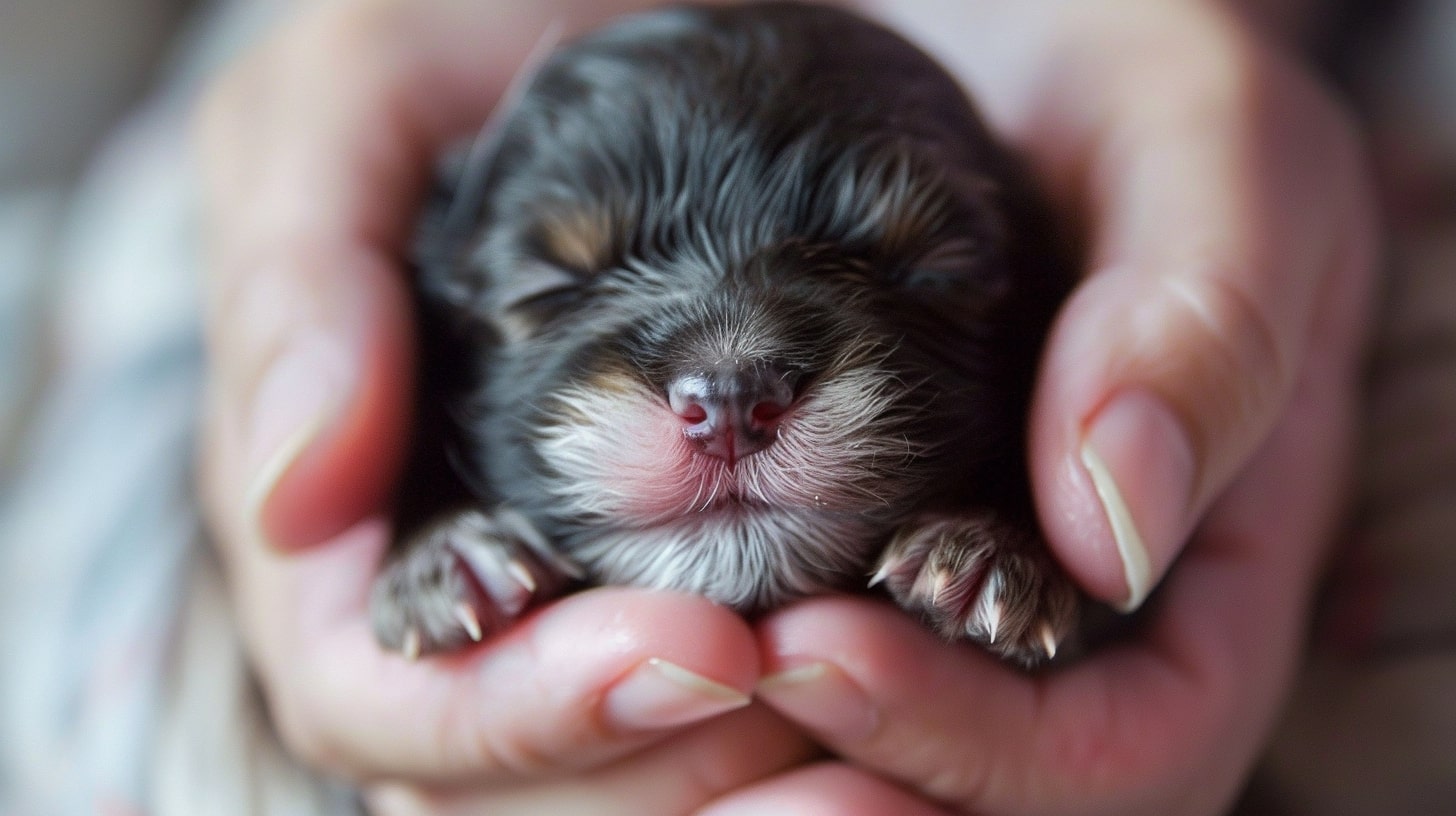
Key Milestones
The first weeks of a puppy’s life are marked by rapid development, much of which occurs while they are completely dependent on their mother. Newborn puppies are born blind, deaf, and toothless, with limited movement capabilities. Their eyes and ears begin to open around the 10 to 14-day mark, introducing them to the world of sights and sounds.
Health Considerations
During this critical time, the mother’s milk provides essential nutrients and antibodies that are crucial for the puppies’ immune systems. Owners should ensure that the whelping area is warm and clean, as newborns are unable to regulate their body temperature and are susceptible to infections.
Owner’s Role in Early Development
Although the mother will do most of the work at this stage, responsible breeders and owners should monitor the puppies for any signs of distress or poor health. It’s also important to begin gentle handling of the puppies to start the process of human socialization.
Fun Fact: Did you know that a puppy’s sense of touch is one of the first to develop? They start to feel their environment as soon as they’re born!
Stay tuned for a comprehensive journey through each delightful leap in development as your puppy quickly grows from a sleepy ball of fur into a dynamic and engaging companion. Understanding the immunological, physiological, and emotional needs of your newborn pup sets the foundation for a healthy and happy life ahead.
The Transitional Period: 2 to 4 Weeks

The transitional period is a pivotal stage in a puppy’s development, symbolizing the bridge between complete dependency and the beginning of independence. For the new puppy owner, understanding and supporting your puppy during this phase is crucial for their growth and future learning.
Sensory and Motor Development
At the start of the transitional period, puppies begin to open their eyes and ears, experiencing the world in a completely new way. By the end of the fourth week, most puppies will have their eyes fully open and will start to respond to light, movement, and sound. Though their vision is still limited, they begin to explore their surroundings with newfound curiosity.
Their motor skills also see significant development during this stage. Initially, puppies will have only enough strength to crawl weakly, but by the end of the transitional period, they will be taking their first wobbly steps. This newfound mobility allows for a greater level of interaction with their environment and littermates.
The Introduction of Solid Food
As the puppies’ teeth start to come in, they are introduced to their first solid food. This typically begins with a soft puppy mush made from high-quality puppy food soaked in water or puppy milk replacer. This gradual weaning process will reduce their dependency on their mother’s milk and is a practice the owner should closely monitor to ensure puppies are receiving adequate nutrition.
During this stage, owners should introduce a consistent feeding schedule, providing the framework for regular eating habits and aiding in housebreaking routines later on.
Environmental Socialization Begins
Socialization is critical at this stage; hence, the environment in which the puppies are raised should be rich with various stimuli. Gentle handling by humans and exposure to different textures, sounds, and smells enable the development of cognitive function and emotional resilience.
Key Takeaway: The 2- to 4-week period is the start of a social and physical awakening for puppies. This stage forms the basis of their perception of the world and their place within it.
Overall, the transitional period envelops key elements of sensory development, gradual introduction to solid foods, and the onset of environmental socialization. The owner’s role is to facilitate a safe and stimulating environment that fosters growth and curiosity in the ever-changing puppies’ lives.
The Socialization Stage: 4 to 12 Weeks

Socialization is the process by which puppies learn to identify and interact with their own species as well as other animals, people, and their environment. This period is fondly known as the “golden period” of puppy education because experiences during this time set the groundwork for how the puppy will view the world as an adult dog.
Interaction With People and Other Animals
Puppies in the socialization stage need to meet a wide variety of people and, if safely possible, other pets and animals. Exposure to different ages, sizes, and types of people, including those wearing hats, glasses, or uniforms, helps them become well-adjusted adults. Supervised interaction with other healthy, vaccinated dogs and animals is equally beneficial for developing social skills.
Fear Response and Critical Learning
During this stage, puppies begin to exhibit a fear response, which plays a crucial role in survival. They may initially react warily or scared to new experiences. A balanced approach that involves gradually exposing them to new situations, without overwhelming them, helps build confidence and reduces fearfulness.
- Introduce new experiences slowly and positively
- Avoid negative encounters that could result in fear or aggression
- Use treats and praise to reward curiosity and brave behaviour
Health and Vaccination Schedule
Puppies will need to begin their series of vaccinations that protect against various diseases. An exact schedule should be discussed with your veterinarian, but it generally starts around 6 to 8 weeks of age. Keep in mind that until your puppy is fully vaccinated, they should not be exposed to unvaccinated animals or environments where other dogs frequent.
Remember: The experiences your puppy has during the socialization stage can significantly influence their future personality and behaviour. Positive early experiences are essential for raising a well-mannered and sociable dog.
In summary, the socialization stage is a critical time for puppies to develop interpersonal skills, learn from surrounding stimuli, and start their healthcare regimen. Owners are tasked with the important responsibility of guiding their puppies through this formative period with patience, consistency, and love.
The Juvenile Stage: 3 to 6 Months
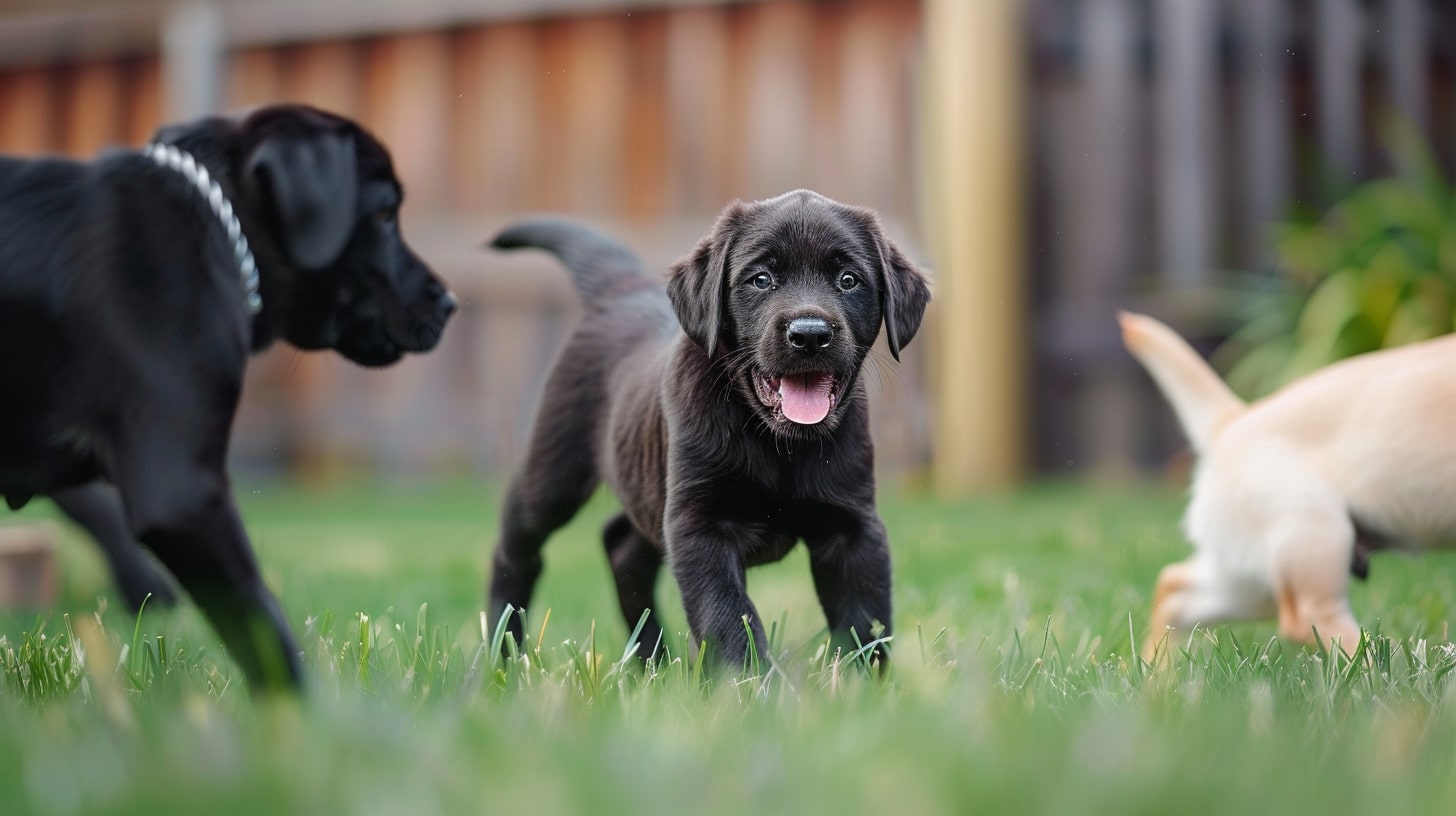
As puppies leave the socialization stage, they enter what is known as the juvenile period. This stage is characterized by continued physical growth and behavioural development. Puppies in this phase are often likened to ‘teenagers,’ showing a mixture of independence, energy, and, sometimes, defiance.
Growth and Physical Changes
During the juvenile stage, puppies grow rapidly. This exponential growth requires plenty of good nutrition to support their energy needs and the development of bones, muscles, and organs. Ensure you are feeding high-quality, balanced puppy food that is appropriate for the puppy’s size and breed.
Training Basics: Obedience and Housebreaking
Training should be well underway by the time puppies reach the juvenile stage. Owners should focus on basic obedience commands such as sit, stay, come, down, and heel. Housebreaking becomes critical, and puppies should be taken out regularly to prevent accidents and establish a routine.
Consistency is key, as is positive reinforcement. Reward-based training techniques help foster a strong, trusting relationship between the puppy and owner. During this period, some puppies may test boundaries, so it’s important to remain patient but firm in your training efforts.
Nutritional Needs and Feeding
The dietary needs of puppies in the juvenile stage are significant. Puppies should be fed three to four times a day with intervals and portions that are consistent with their breed and size. It’s also a critical time to establish healthy eating habits that will serve them well into adulthood.
Be mindful of overfeeding or underfeeding, as both can have adverse effects on your puppy’s health. Monitoring body condition and adjusting food as needed is vital. Always provide fresh water, and be cautious of dietary changes that may cause digestive issues.
Pro Tip: When it comes to training and nutrition, the juvenile phase is all about striking a balance between structure and flexibility. Puppies need routine but also variety to keep them engaged and developing properly.
In the juvenile stage, emphasis on correct training techniques, understanding of dietary needs, and adjustment to puppy’s rapid growth are paramount to ensure a well-behaved and healthy adult dog. With a hands-on approach, owners can enjoy this active period while effectively guiding their puppies through these transformative months.
The Adolescent Stage: 6 to 12 Months
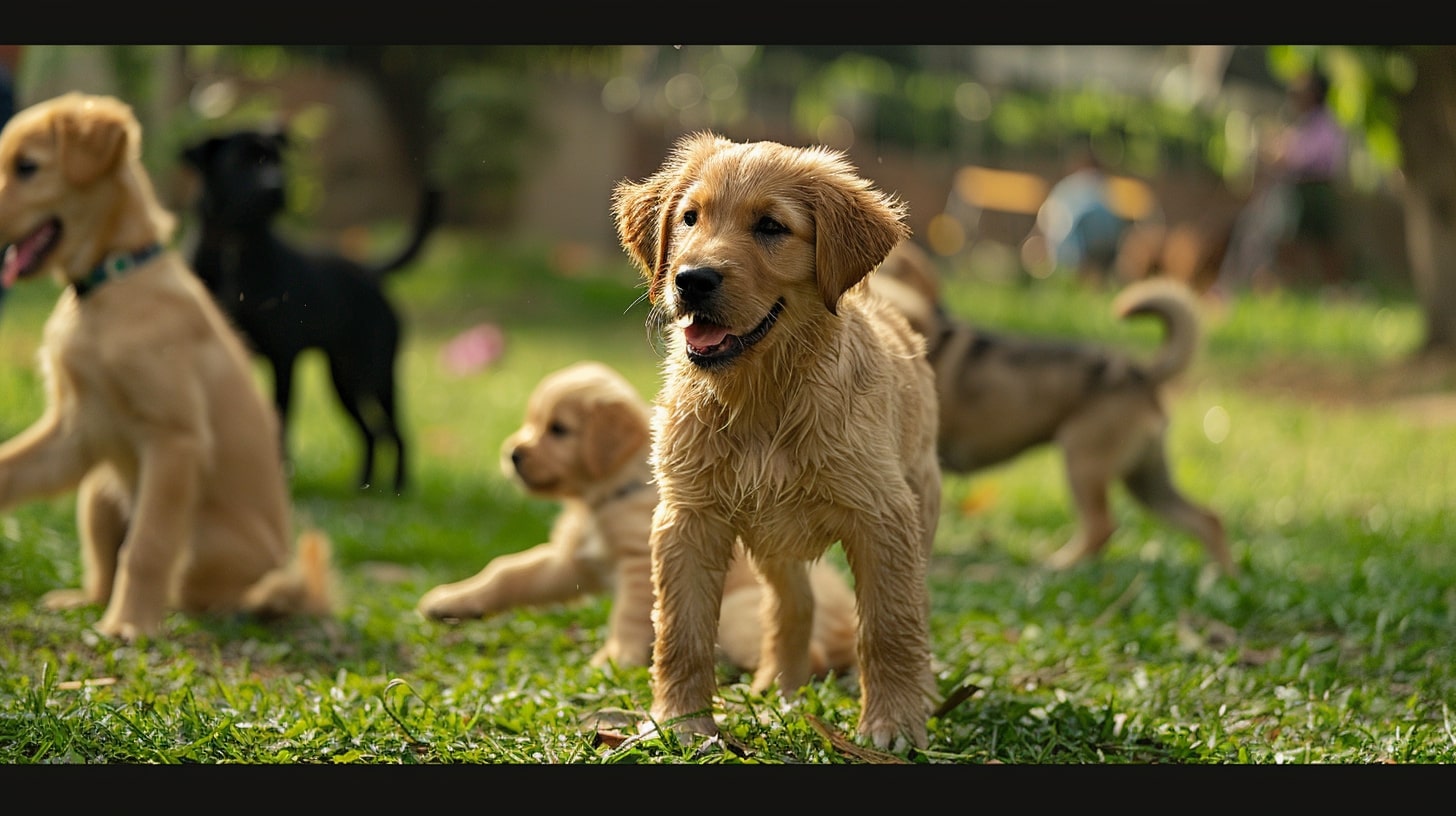
The adolescent stage can be challenging yet rewarding, as puppies mature and solidify their personality traits. During this period, they will test boundaries, explore hierarchies, and may forget some of their prior training as they navigate the complexities of ‘teenage’ life.
Behavioural Changes and Challenges
Adolescent puppies may exhibit increased independence and may start testing their place in the social hierarchy, leading to some rebellious behaviour. It’s essential to continue training and socialization during this time to reinforce good behaviour and discourage bad habits.
Owners might observe an increase in energy levels, and some puppies may become more assertive or even challenging. This might include ignoring commands or showing signs of possessive behaviour. Consistent training, patience, and positive reinforcement are vital in managing these behaviours.
Advanced Training and Socialization
Advanced training strategies may begin at this stage. Building on the foundation of basic commands, owners can introduce more complex tasks and continue socialization practices to ensure their dog is well-adjusted in various situations.
Continue attending puppy classes or engage in group training sessions to maintain social interaction. This also provides a controlled environment to work on any behavioural issues that may arise and strengthen the bond between the puppy and its owner.
Preparing for Adulthood: Spaying or Neutering Information
This stage is also a prime time to consider spaying or neutering if it has not been done already. There are various health benefits to these procedures, including reducing the risk of certain cancers and decreasing unwanted behaviours related to hormones.
Discuss with your veterinarian the appropriate timing for these procedures, as well as any questions or concerns you may have about them. This decision can impact your dog’s long-term health and temperament.
Remember: Adolescence tests both the puppy and the owner, but it is also a time of significant bonding and learning. Stay consistent, maintain structure, and provide ample love and guidance as your puppy navigates this challenging phase.
Over this period, puppies undergo significant behavioural and physical changes that foreshadow their adult form. By supporting these changes with effective training, nutrition, and preventive care, owners can help their adolescent puppies grow into well-behaved and physically healthy adult dogs.
Transition to Adulthood: 1 to 2 Years
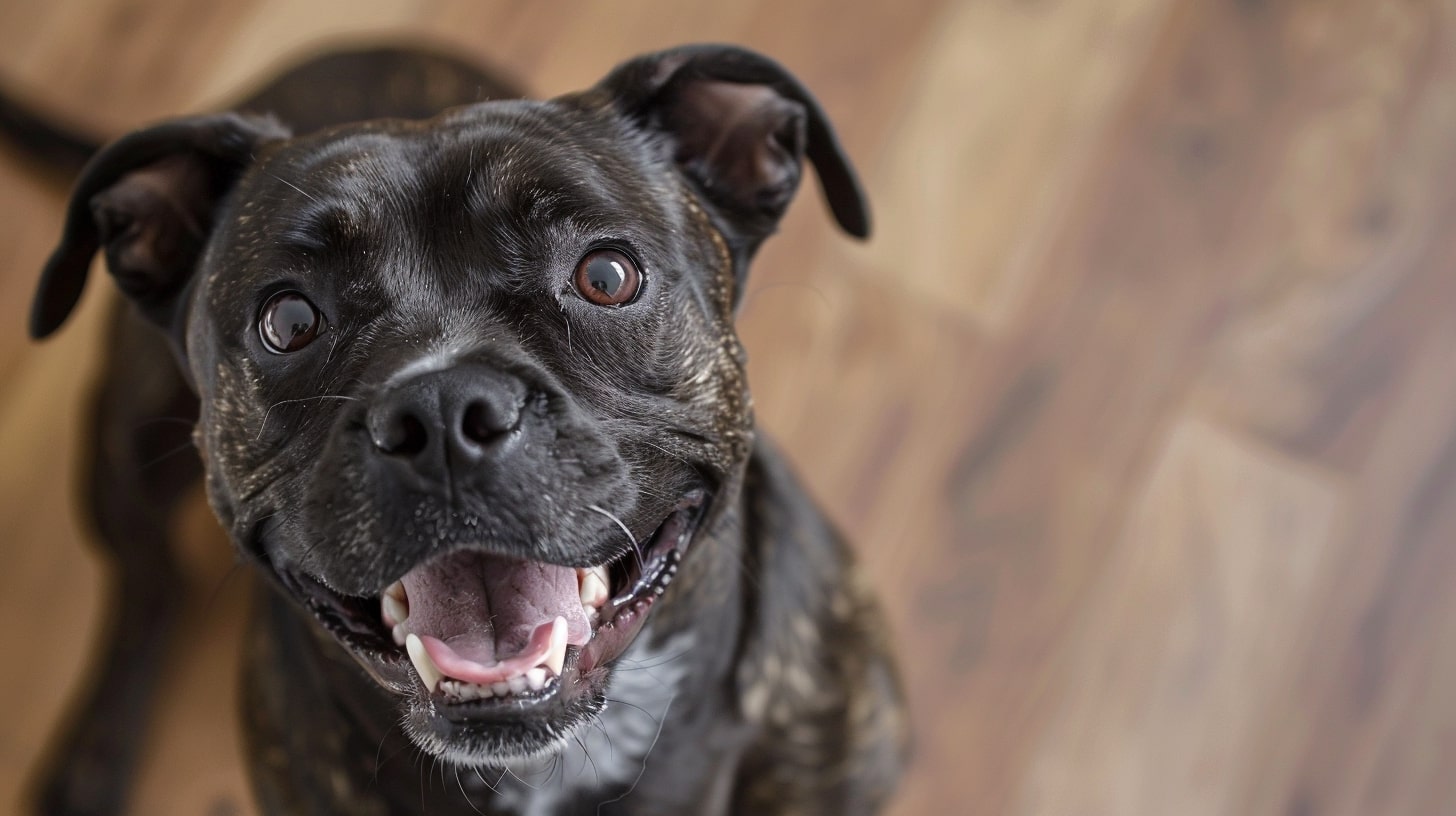
As puppies approach their first birthday, they are transitioning into adulthood. This is a time for owners to reinforce good behaviour, establish lasting routines, and prepare for the calmer, more mature phase of their dog’s life.
What to Expect as Your Puppy Matures
Approaching the first year, you may begin to notice a plateau in your dog’s physical growth. Large breeds may continue to fill out, gaining muscle and breadth, whereas smaller breeds oftentimes complete their growth earlier. Behaviorally, dogs start to settle down, though high-energy breeds may maintain their playfulness well into adulthood.
Settling into Adult Behaviors and Routines
As your dog matures, it is crucial to solidify the daily routines established during puppyhood. Regular exercise, a consistent feeding schedule, and ongoing training and mental stimulation should continue as part of their routine.
Understanding your dog’s breed characteristics is also important, as it can give insight into their exercise needs and potential health issues. Continuing obedience and skill training can keep their minds engaged and promote a well-rounded adult dog.
Long-term Health Management
As your puppy grows into an adult dog, their healthcare needs become more about maintenance and prevention. Annual check-ups, teeth cleaning, and continued vaccinations are important for long-term health. Managing weight is also critical during this stage to avoid obesity-related health problems.
As your dog’s dietary needs change, consult with your veterinarian to ensure their nutrition is supporting their adult body and lifestyle appropriately.
Key Note: The transition to adulthood marks a new chapter in a dog’s life—a time of continued learning, deepened bonds, and enjoyment of the years invested in training and care.
Adulthood in dogs brings a new set of challenges and rewards and requires the owner to adapt to the dog’s evolving needs. With attentive care and an understanding of these changes, you can enjoy a fulfilling relationship with your companion for years to come.
Beyond the Basics: Understanding Your Puppy’s Unique Development
Breed-Specific Developmental Milestones
While general canine developmental stages are quite universal, specific breeds can have unique milestones and growth rates. Large breeds often grow for a longer period and may have a more extended adolescent stage, while small breeds may mature faster. It’s essential to know what’s typical for your breed to appropriately tailor their nutrition, exercise, and training.
The Role of Genetics and Environment in Development
Genetics can influence a puppy’s temperament, size, and susceptibility to certain health conditions. However, the environment also plays a crucial role in development. A nurturing environment that includes proper nutrition, socialization, and training can mitigate potential genetic setbacks and promote optimal growth.
When Development Doesn’t Go as Planned: Recognizing Delays
Developmental delays or deviations can occur and may be a sign of health issues, nutritional deficiencies, or other problems. Being alert to your puppy’s progress and consulting with a veterinarian if there are concerns are important steps in ensuring a healthy development trajectory.
Tip: While breed standards provide a guideline, each puppy is unique, and deviation from the ‘norm’ isn’t necessarily a problem. Careful observation and routine vet visits are necessary to ensure personalized care for your puppy’s specific developmental path.
Owners benefit from understanding that while developmental milestones can be predicted, each puppy will grow at their own rate. Recognizing and accommodating individual developmental needs can make the journey from puppyhood to adulthood a smooth one.
The Importance of Regular Veterinary Care
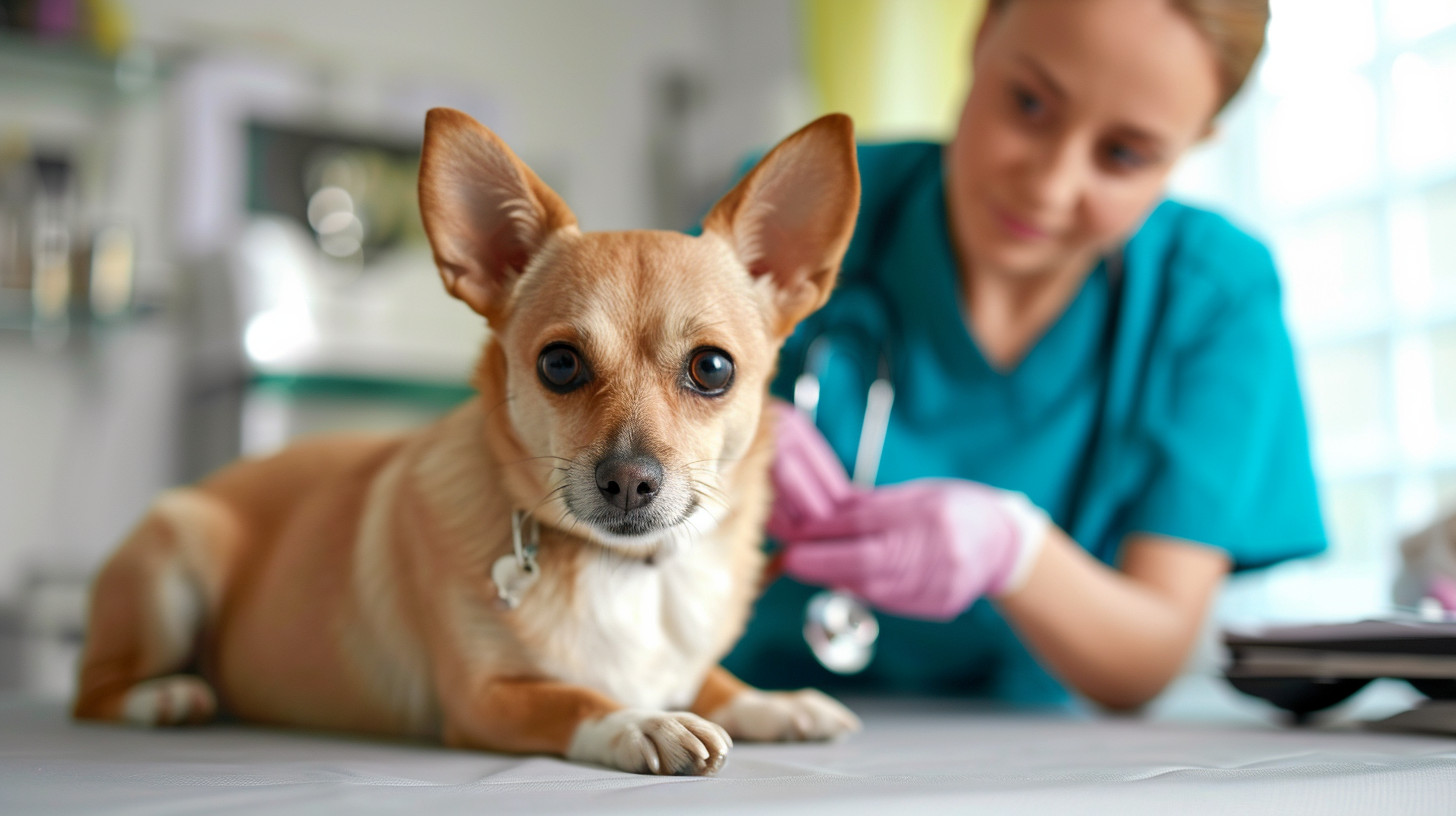
Maintaining your puppy’s health means establishing a relationship with a trusted veterinarian and adhering to a regular veterinary care schedule. As your puppy grows, regular check-ups are as essential as nutrition and training for their overall well-being.
Developmental Health Check-ups
Throughout the various puppy development stages, scheduled health check-ups are essential to monitor physical growth and detect potential health issues early. These visits can track your puppy’s weight, check for congenital conditions, and assess developmental milestones.
Preventative Care Throughout Developmental Stages
Preventative care includes regularly scheduled vaccinations, parasite control, and dental hygiene. Being proactive can help prevent more serious health concerns as your puppy ages. Discuss with your vet the best preventative care plan for your puppy.
Addressing Developmental Concerns with Your Vet
At any sign of abnormal development, such as delayed growth, behavioural changes, or unusual symptoms, consulting with your vet is critical. They can offer invaluable advice and treatment options. Whether it’s a minor issue or something that requires more attention, early intervention is key.
Remember: Regular veterinary check-ups are the cornerstone of your puppy’s long-term health. They ensure that your dog’s growth is on track and help prevent the onset of future health issues.
Ensuring your growing puppy gets the veterinary care they need will contribute significantly to their quality of life. From vaccinations to nutritional advice, a vet plays an integral role in every stage of your puppy’s development.
Training and Behavior
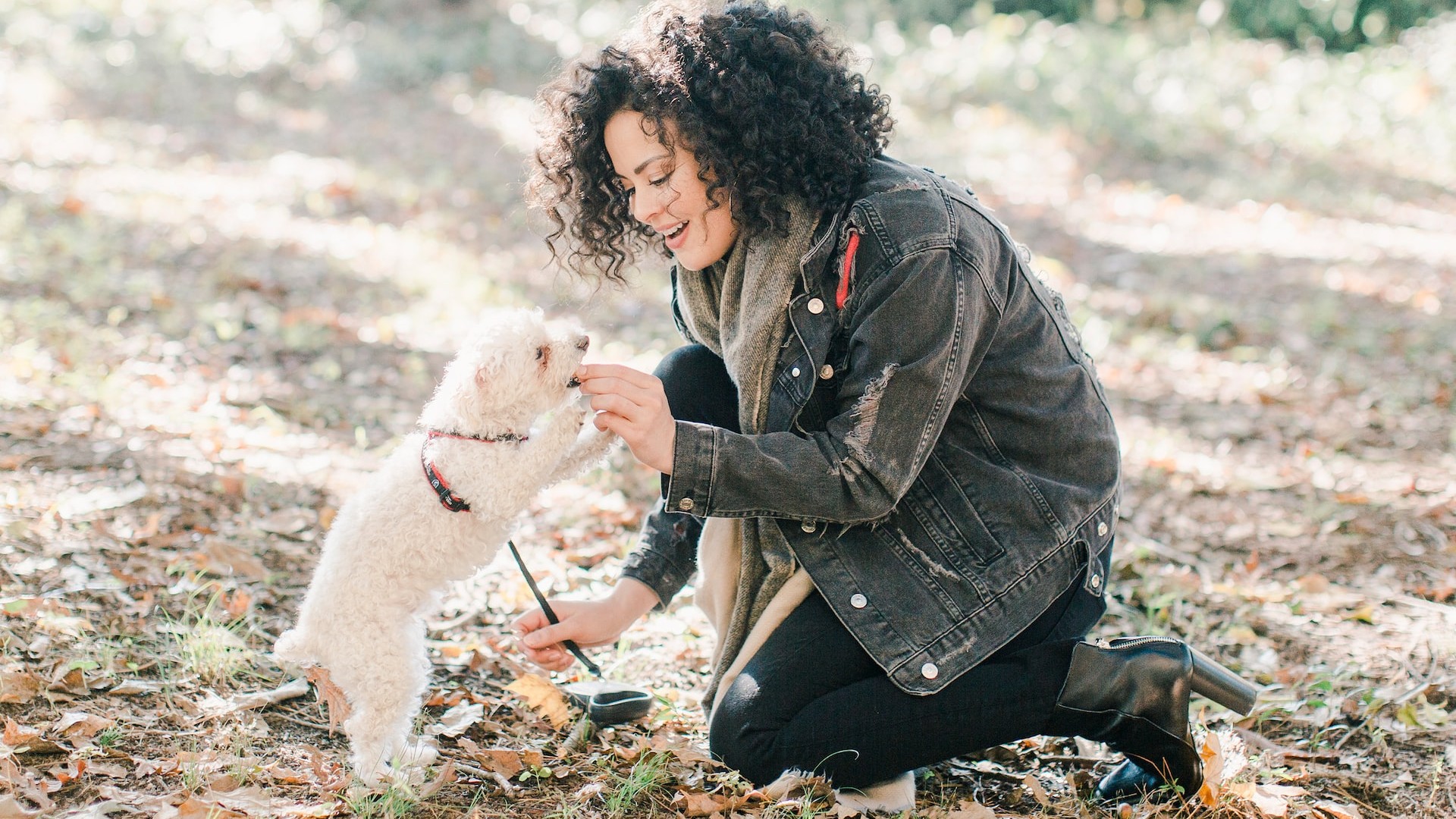
Adapting Your Training as Your Puppy Grows
As your puppy matures, training methods and goals will adapt. Young puppies benefit from short, positive training sessions, while older puppies can handle more complex commands and longer durations. Training should be a continuous process that grows along with your puppy’s cognitive abilities.
Common Behavioral Issues and Resolutions
Behavioural issues, such as chewing, barking, or even aggression, may surface as your puppy develops. Addressing these issues early with consistent, positive training techniques can prevent long-term problems. If necessary, professional help from a dog trainer or behaviourist should be considered.
The Impact of Early Stage Training on Long-Term Behavior
The foundation laid in early puppyhood significantly impacts your dog’s behaviour for the rest of their life. Socialization, obedience training, and positive experiences help to ensure your puppy grows into a well-behaved adult dog.
Keep in mind: Effective training and behaviour management are not one-size-fits-all. They should evolve with your puppy’s developmental stage, personality, and individual learning pace.
The right training and behavioural guidance throughout puppyhood enable a smooth transition into a balanced adult dog. It encourages good citizenship in the dog community and a harmonious life with their human companions.
Nutritional Needs Through the Stages
Changing Dietary Requirements
As your puppy grows, their nutritional needs will change. It’s important to adapt their diet accordingly, transitioning from high-energy puppy food to formulas suitable for their size, activity level, and age. The right balance of protein, fats, carbohydrates, minerals, and vitamins is necessary for maintaining optimal health.
Understanding Puppy Food Labels
Understanding the information on puppy food labels can be challenging. Look for foods that meet the standards set by organizations such as the Association of American Feed Control Officials (AAFCO). Ingredients are listed by weight, so high-quality protein sources should be near the top of the list.
The Role of Diet in Development
A balanced diet plays a substantial role in a puppy’s growth and development. Lack of certain nutrients can lead to developmental problems, while excess, particularly of calories or calcium, can create issues, especially in large breed dogs.
Pro Tip: Proper nutrition is as critical to your puppy’s health as it is to their development. Tailoring your puppy’s diet to their developmental stage can promote healthy growth and prevent future health problems.
By understanding and meeting your puppy’s dietary needs throughout each stage of development, you can support their growth into a healthy adult dog. Nutritional care, when paired with regular exercise and vet check-ups, is essential in raising a vibrant and resilient canine companion.
FAQ
What if my puppy is not meeting developmental milestones?
If your puppy is not meeting general developmental milestones, it’s important to consult your veterinarian. They can assess whether there’s a cause for concern and may suggest further diagnostics or tailored recommendations. Each puppy develops at their own pace, but certain lags, especially in weight gain, motor skills, or social development, warrant professional advice.
How do I socialize a fearful puppy?
Socializing a fearful puppy involves gradual exposure to new experiences, providing a safe environment, and avoiding forcing them into frightening situations. Use positive reinforcement to reward bold behaviour. If challenges persist, seeking the help of a professional dog trainer or behaviourist can be beneficial.
Can I train my puppy before it is vaccinated?
Yes, you can start training your puppy at home before they are fully vaccinated. However, to prevent exposure to diseases, avoid public places where other dogs frequent until your vet gives the all-clear. In-home training is a safe and effective way to begin your puppy’s education.
What are the risks of overfeeding my puppy?
Overfeeding can lead to obesity and related health problems such as diabetes, joint issues, and decreased lifespan. For large breed puppies, too rapid growth can also increase the risk of orthopedic diseases. It’s crucial to follow feeding guides and monitor your puppy’s body condition closely.
How often should I take my puppy to the vet during the first year?
During the first year, your puppy will visit the vet multiple times for vaccinations, health screenings, and spaying or neutering. Routine check-ups are usually scheduled every 3-4 weeks until the puppy is about 4 months old, after which visits may become less frequent. Your veterinarian will provide a personalized schedule based on your puppy’s specific needs.
